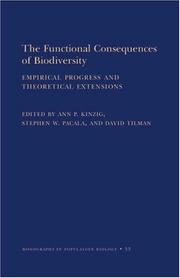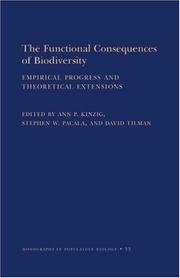| Listing 1 - 10 of 10 |
Sort by
|
Article
Abstract | Keywords | Export | Availability | Bookmark
 Loading...
Loading...Choose an application
- Reference Manager
- EndNote
- RefWorks (Direct export to RefWorks)
Article
Abstract | Keywords | Export | Availability | Bookmark
 Loading...
Loading...Choose an application
- Reference Manager
- EndNote
- RefWorks (Direct export to RefWorks)
Article
Abstract | Keywords | Export | Availability | Bookmark
 Loading...
Loading...Choose an application
- Reference Manager
- EndNote
- RefWorks (Direct export to RefWorks)

ISBN: 0691088217 0691088225 Year: 2001 Volume: 33 Publisher: Princeton : Princeton University Press,
Abstract | Keywords | Export | Availability | Bookmark
 Loading...
Loading...Choose an application
- Reference Manager
- EndNote
- RefWorks (Direct export to RefWorks)
Biodiversity --- Ecology --- Biodiversité --- Ecologie --- 502.2 --- 502.4 --- 574.3 --- 574.472 --- 574.472 Biodiversity --- 574.3 Populations and environment. Population dynamics --- Populations and environment. Population dynamics --- 502.4 Nature reserves. Protected areas in general and their management --- Nature reserves. Protected areas in general and their management --- 502.2 Nature study. Observation of nature. Natural history --- Nature study. Observation of nature. Natural history --- Biological diversification --- Biological diversity --- Biotic diversity --- Diversification, Biological --- Diversity, Biological --- Biology --- Biocomplexity --- Ecological heterogeneity --- Numbers of species --- Biodiversity.

ISBN: 1299051480 1400847303 9781400847303 0691088225 9780691088228 0691088217 9780691088211 0691088225 9780691088228 Year: 2001 Volume: 33 Publisher: Princeton Princeton University Press
Abstract | Keywords | Export | Availability | Bookmark
 Loading...
Loading...Choose an application
- Reference Manager
- EndNote
- RefWorks (Direct export to RefWorks)
Does biodiversity influence how ecosystems function? Might diversity loss affect the ability of ecosystems to deliver services of benefit to humankind? Ecosystems provide food, fuel, fiber, and drinkable water, regulate local and regional climate, and recycle needed nutrients, among other things. An ecosyste's ability to sustain functioning may depend on the number of species residing in the ecosystem--its biological diversity--but this has been a controversial hypothesis. There are many unanswered questions about how and why changes in biodiversity could alter ecosystem functioning. This volume, written by top researchers, synthesizes empirical studies on the relationship between biodiversity and ecosystem functioning and extends that knowledge using a novel and coordinated set of models and theoretical approaches. These experimental and theoretical analyses demonstrate that functioning usually increases with biodiversity, but also reveals when and under what circumstances other relationships between biodiversity and ecosystem functioning might occur. It also accounts for apparent changes in diversity-functioning relationships that emerge over time in disturbed ecosystems, thereby addressing a major controversy in the field. The volume concludes with a blueprint for moving beyond small-scale studies to regional ones--a move of enormous significance for policy and conservation but one that will entail tackling some of the most fundamental challenges in ecology. In addition to the editors, the contributors are Juan Armesto, Claudia Neuhauser, Andy Hector, Clarence Lehman, Peter Kareiva, Sharon Lawler, Peter Chesson, Teri Balser, Mary K. Firestone, Robert Holt, Michel Loreau, Johannes Knops, David Wedin, Peter Reich, Shahid Naeem, Bernhard Schmid, Jasmin Joshi, and Felix Schläpfer.
Biodiversity. --- Biological diversification --- Biological diversity --- Biotic diversity --- Diversification, Biological --- Diversity, Biological --- Biology --- Biocomplexity --- Ecological heterogeneity --- Numbers of species
Book

ISBN: 9780691188362 Year: 2018 Publisher: Princeton, NJ
Abstract | Keywords | Export | Availability | Bookmark
 Loading...
Loading...Choose an application
- Reference Manager
- EndNote
- RefWorks (Direct export to RefWorks)
Digital

ISBN: 9780691188362 Year: 2018 Publisher: Princeton, N.J. Princeton University Press
Abstract | Keywords | Export | Availability | Bookmark
 Loading...
Loading...Choose an application
- Reference Manager
- EndNote
- RefWorks (Direct export to RefWorks)
Book

ISBN: 0691195323 9780691195322 Year: 2020 Publisher: Princeton, NJ
Abstract | Keywords | Export | Availability | Bookmark
 Loading...
Loading...Choose an application
- Reference Manager
- EndNote
- RefWorks (Direct export to RefWorks)
Leading ecologists discuss some of the most compelling open questions in the field todayUnsolved Problems in Ecology brings together many of the world's leading ecologists to discuss the most fundamental research questions confronting the field today. This diverse and thought-provoking collection of essays spans virtually all of the key subfields of the discipline, from behavioral and evolutionary ecology to population biology, community ecology, ecosystem ecology, disease ecology, and conservation biology. These essays are intended to stoke curiosity, challenge prevailing wisdom, and provoke new ways of thinking about ecology in light of new technologies and unprecedented environmental challenges brought on by climate and land-use change. Authoritative and accessible, Unsolved Problems in Ecology is ideal for graduate students in the early stages of their scientific careers and an essential resource for seasoned ecologists looking for exciting new directions to take their research.Sheds light on modern ecology's most important and compelling open questionsFeatures thought-provoking contributions from more than two dozen world-class ecologistsCovers behavior, evolution, communities, ecosystems, resource management, and moreDiscusses ways to raise the financial and intellectual profile of the disciplineAn invaluable resource for graduate students as well as seasoned ecologists
Ecology. --- Population biology. --- Coexistence of species. --- Ecosystem management. --- Biodiversity conservation. --- Biodiversity --- Biological diversity conservation --- Conservation of biodiversity --- Diversity conservation, Biological --- Gender mainstreaming in biodiversity conservation --- Maintenance of biological diversity --- Preservation of biological diversity --- Conservation of natural resources --- Ecosystem management --- Biotic communities --- Ecosystems management --- Applied ecology --- Environmental management --- Nature conservation --- Biodiversity conservation --- Sympatry (Biology) --- Population biology --- Species --- Biology --- Ecology --- Balance of nature --- Bionomics --- Ecological processes --- Ecological science --- Ecological sciences --- Environment --- Environmental biology --- Oecology --- Environmental sciences --- Conservation --- Management --- auto ecology. --- autoecology. --- conservation. --- ecological communities. --- environmental policy. --- environmentalism. --- food web structure. --- food webs. --- growth regulation. --- high dimensional trait space. --- individual-based data. --- interdependence and mutualism. --- intra-genomic variance. --- mating. --- mutation. --- natural resource management. --- population dynamics of complex life cycles. --- population dynamics. --- population size. --- scaling in ecology. --- soil biodiversity. --- species coexistence. --- species richness distribution. --- variance explicit ecology.
Digital

ISBN: 9780691195322 Year: 2020 Publisher: Princeton, N.J. Princeton University Press
Abstract | Keywords | Export | Availability | Bookmark
 Loading...
Loading...Choose an application
- Reference Manager
- EndNote
- RefWorks (Direct export to RefWorks)
Digital

ISBN: 9781400860180 9780691604527 Year: 2014 Publisher: Princeton, N.J. Princeton University Press
Abstract | Keywords | Export | Availability | Bookmark
 Loading...
Loading...Choose an application
- Reference Manager
- EndNote
- RefWorks (Direct export to RefWorks)
| Listing 1 - 10 of 10 |
Sort by
|

 Search
Search Feedback
Feedback About UniCat
About UniCat  Help
Help News
News